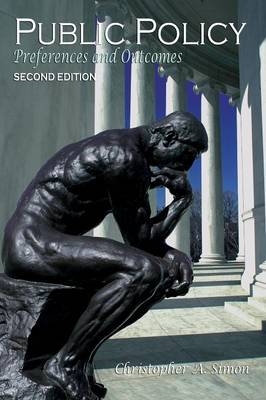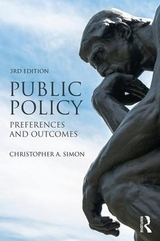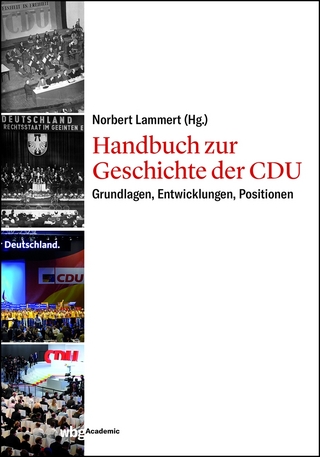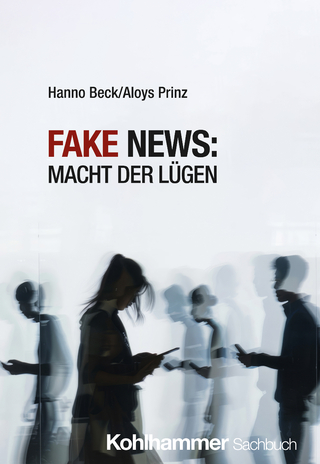
Public Policy
Routledge (Verlag)
978-0-205-74482-4 (ISBN)
- Titel erscheint in neuer Auflage
- Artikel merken
Christopher A. Simon is Professor of Political Science and a former Director of the MPA Program at The University of Utah. He conducts research in alternative energy policy; civic community and volunteerism; education policy; criminal justice policy; Homeland Security policy; land use policy; public administration; and military sociology.
PART I Introduction to Public Policy
Chapter 1 Policy and Visions of Governance
Chapter Overview
A Working Definition of Public Policy
Classical Liberalism
Modern Liberalism and Public Policy
The Nature of Liberalism in the United States
Communitarianism: Another Way of Viewing Society and Policy
Lessons Learned
Key Terms Questions for Study
Endnotes
Bibliography
Chapter 2 Theories of Public Policy: How Choices Are Made
Chapter Overview
The Importance of Science in Studying Public Policy
The Rational-Comprehensive Model
Incrementalism
Public Choice
Group Theory
Systems Theory
Institutionalism
Elite Theory
Game Theory
Neo-Institutionalism
Lessons Learned
Key Terms
Questions for Study
Endnotes
Bibliography
Chapter 3 Values and Public Policy
Chapter Overview
Regime Values
Civic Engagement, Social Capital, and Values
Bases of Individual Values
Economics and Societal Value Changes
How Values Have and Continue to Change
Lessons Learned
Key Terms
Questions for Study
Endnotes
Bibliography
Chapter 4 Policy Analysis
Chapter Overview
Economics
Rise of Policy Sciences
Growth of Public Policy
Central Questions for Public Policy Analysis
Tools for Policy Analysis
Outcomes of Public Policy Analysis
Ethics and Policy Analysis
Lessons Learned
Key Terms
Questions for Study
Endnotes
Bibliography
Part II Policy Process
Chapter 5 Agenda Setting
Chapter Overview
How Does Agenda Setting Work?
The President as Agenda Setter
Congress and the Policy Agenda
Congressional-Executive Relations and Agenda Setting
The Courts and the Policy Agenda
Pressure Groups and Agenda Setting
Bureaucracy and Agenda Setting
Media and Agenda Setting
Elections and the Policy Agenda
Cultural Change and Agenda Setting
Biases in Political Participation and Agenda Setting
Explaining Agenda Setting
Lessons Learned
Key Terms
Questions for Study
Endnotes
Bibliography
Chapter 6 Policy Formulation
Chapter Overview
How Is Policy Formulated?
Major Actors in Policy Formulation
Demographic Changes and Policy Formulation
Explaining Policy Formulation
Lessons Learned
Key Terms
Questions for Study
Endnotes
Bibliography
Chapter 7 Policy Implementation
Chapter Overview
Theoretical Model of Policy Implementation
Issues Surrounding Implementation
Major Participants in Policy Implementation
Explaining Policy Implementation
Lessons Learned
Key Terms
Questions for Study
Endnotes
Bibliography
Chapter 8 Policy Evaluation
Chapter Overview
Skills of a Good Policy Evaluator
General Purposes of Evaluation
Internal Versus External Evaluation
Types of Evaluations
Lessons Learned
Key Terms Q
uestions for Study
Endnote
Bibliography
Chapter 9 Policy Termination
Chapter Overview
Definition of Termination
Key Actors in Termination
Reasons for Termination
Roadblocks to Termination
Termination: When it a Good Time?
A Model of Policy Termination
Case Study
Explaining Policy Termination
Lessons Learned
Key Terms
Questions for Study
Endnotes
Bibliography
Chapter 10 Federalism and Intergovernmental Relations (IGR)
Chapter Overview
Arguments in Favor of Federalism
Dual Federalism Model
Cooperative Federalism
Nation-Centered Federalism
Clintonian Federalism and Beyond
Intergovernmental Relations
Intergovernmental Collaborative Policy-Making
Fiscal Federalism
Lessons Learned
Key Terms
Questions for Study
Endnotes
Bibliography
Part III Major Public Policies
Chapter 11 Defense Policy
Chapter Overview
The Defense Policy Structure
Major Participants in Defense Policy
Defense Policy During the Cold War
Nuclear Arms Race
Nuclear Weapons Treaties
Post—Cold War Era
Post—Post Cold War Era and the War on Terrorism
Quadrennial Defense Review (QDR) 2006
Ballistic Missile Defense
Homeland Security
Explaining Defense Policy
Lessons Learned
Key Terms
Questions for Study
Endnotes
Bibliography
Case Study
Chapter 12 Public Health Policy
Chapter Overview
Major Actors in Public Health Policy
Department of Health and Human Services
Medicare: How it Works
Medicaid
State Children’s Health Insurance Program (SCHIP)MM
FFFood and Drug Administration (FDA)
Health Resources and Services Administration (HRSA)
Indian Health Service (IHS)
National Institutes of Health (NIH)
Substance Abuse and Mental Health Services Administration (SAMHSA)
Explaining Public Health Policy
Lessons Learned
Key Terms
Questions for Study
Endnotes
Bibliography
Group Project
Chapter 13 General Social Policy
Chapter Overview
Scope of Social Policy
Social Security Administration
U.S. Department of Agriculture: Food and Nutrition
U.S. Department of Housing and Urban Development
U.S. Department of Labor: Unemployment Compensation
Explaining General Social Policy
Lessons Learned
Key Terms
Questions for Study
Endnotes
Bibliography
Case Study
Chapter 14 Education Policy
Chapter Overview
Major Participants in Education Policy
Education Policy Reform Proposals
Public Policy and Educational Equality
Explaining Education Policy
Lessons Learned
Key Terms
Questions for Study
Endnotes
Bibliography
Case Study
Chapter 15 Criminal Justice Policy
Chapter Overview
Major Participants
Types of Crime
Causes of Crime
Crimes and Criminal Procedure
Perspectives on Punishment
Incarceration Policy and Management
Hot Topic Crimes in the Twenty-First Century
Contemporary Policing Techniques and Issues
Explaining Criminal Justice Policy
Lessons Learned
Key Terms
Questions for Study
Endnotes
Bibliography
Case Study
Chapter 16 Green Policy
Chapter Overview
The Commons
Key Actors in Green Policy
Environmental Protection Agency
Federal Environmental Regulations
Resource Consumption
Water Politics and Policy
Renewable Energy: Protecting the Environment and Reducing Harmful Extractions
Explaining Environmental Policy
Lessons Learned
Key Terms
Questions for Study
Endnotes
Bibliography
Case Study
Chapter 17 Cost of Policy
Chapter Overview
A Definition of Budgeting
Explaining the Size of the National Budget
Budget Cycle
A Bit About National Government Public Finance
Revenue Streams
Major Participants and Influences
Budget Theory
Politics of Entitlement
The Budget and Implications for Policy
Explaining Public Budgeting
Lessons Learned
Key Terms
Questions for Study
Endnote
Bibliography
Group Project
Conclusion Future of Public Policy
Chapter Overview
Commodification/Decommodification
Technology and the Future of Policy
Values and the Future of Policy
Conclusion
Bibliography
| Erscheint lt. Verlag | 14.1.2010 |
|---|---|
| Verlagsort | New York |
| Sprache | englisch |
| Maße | 152 x 229 mm |
| Gewicht | 481 g |
| Themenwelt | Sozialwissenschaften ► Politik / Verwaltung |
| ISBN-10 | 0-205-74482-6 / 0205744826 |
| ISBN-13 | 978-0-205-74482-4 / 9780205744824 |
| Zustand | Neuware |
| Haben Sie eine Frage zum Produkt? |
aus dem Bereich



